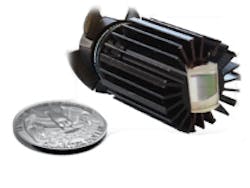NIH funds SemiNex to develop small lasers for enhancing vaccination

SemiNex Corporation (Peabody, MA) was awarded a Small Business Technology Transfer (STTR) grant by the U.S. National Institutes of Health (NIH) to develop small laser devices to enhance immune responses to vaccines. The grant enables the development of these lasers, as well as comparative testing against the existing large laser systems.
SemiNex is collaborating with Dr. Satoshi Kashiwagi of the Vaccine and Immunotherapy Center (VIC) at Massachusetts General Hospital (Boston, MA), who discovered that treatment of the skin with certain infrared lasers promotes better immune responses to vaccines.
"The use of an infrared laser to promote immune responses to vaccination is a novel approach that has shown benefit with an influenza vaccine," says Kashiwagi. "To reach the clinic, the technology first needs to be more widely assessed by laboratories studying vaccines for other diseases."
Designed for ease of use
Up to now, the lasers used to enhance immune responses to vaccines have been large, expensive systems. Scientists who work with vaccines are not typically laser experts nor have ready access to technical assistance. This has inhibited the spread of this technology. The NIH grant will support development of small laser prototypes that will allow testing device kits to be sent to laboratories working on new vaccines.
SemiNex currently produces a small, portable laser device that can be used for skin applications. John Callahan, vice president of engineering and development at SemiNex, will work with VIC to modify this laser device for laboratory use. The grant will also enable SemiNex to develop software to control the laser from a computer, tablet, or smart phone.
With positive results, SemiNex plans to continue collaboration with VIC to develop a small laser device for clinical use.
"We are interested in developing a laser system that will be easy for scientists to program and use," says David Bean, president of SemiNex. "We want to develop tools that will help scientists make advances in health care. The creation of inexpensive devices that can do the same job as more expensive lasers is at the heart of what our company does."
Source: https://seminex.com/nih-funds-massachusetts-company-to-develop-lasers-for-enhancing-vaccination
About the Author
John Wallace
Senior Technical Editor (1998-2022)
John Wallace was with Laser Focus World for nearly 25 years, retiring in late June 2022. He obtained a bachelor's degree in mechanical engineering and physics at Rutgers University and a master's in optical engineering at the University of Rochester. Before becoming an editor, John worked as an engineer at RCA, Exxon, Eastman Kodak, and GCA Corporation.
